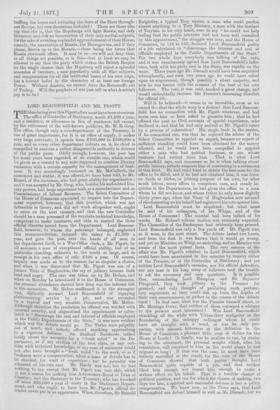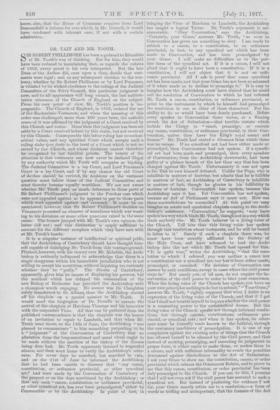LORD BEACONSFIELD AND MR. PIGOTT.
THE blundering over this Pigott affair must have been atrocious. The office of Controller of Stationery, worth £1,200 a year, and a residence, or allowance in lieu of residence, fell vacant, by the retirenaent of the well-known publicist, Mr. W. R. Greg. The office, though only a sub-department of the Treasury, is one of great importance, for it is an office of supply, it makes very large contracts, it spends from £400,000 to £600,000 a year, and as every other department indents on it, its chief is compelled to exercise a rather disagreeable authority in defence of the public purse. Oddly enough, however, the post has for many years been regarded as an outside one, which could be given as a reward to any man supposed to combine literary eminence with a certain capacity for the management of busi- ness. It was accordingly bestowed on Mr. McCulloch, the economist and statist; it was offered, we have been told, to Mr. Russel, of the Scotsman who had great ability for organisation ; and it was accepted by in Greg, who, besides his undoubted lite- rary powers, had large experience both as a manufacturer and as Commissioner of Inland Revenue. The Select Committee of the House of Commons appointed to inquire into the Depart- ment reported, however, that this practice, which was not defensible in theory, and did not work altogether well, ought to cease on the next vacancy, and that the new Controller should be a man possessed of the requisite technical knowledge, competent to make contracts, and able to control the three official Gaeettes issued from the Department. Lord Beacons- field, however, to whom the patronage belonged, neglected this recommendation, reduced the salary to £1,000 a year, and gave the post, over the heads of all men in the department itself, to a War-Office clerk, a Mr. Pigott, by all accounts a man of exceptional official ability, but of no particular standing, unknown to the world at large, and in receipt in his own office of only £400 a year. Of course, inquiry was made as to the reasons for so singular a choice, and when it was discovered that Mr. Pigott was son of a former Vicar of Hughenden, the cry of jobbery became both loud and angry. The case was taken up by Mr. Helms, and when on Monday he introduced it to the House of Commons, the unusual attendance showed how deep was the interest felt in the accusation. Mr. Holms reaffirmed it in the strongest way, distinctly accused Lord Beaconsfield of repaying electioneering service by a job, and was seconded by a typical and very sensible Conservative, Mr, Mellor. Although therefore the resolution he offered was worded with unusual severity, and stigmatised the appointment as calcu- lated to "discourage the zeal and interest of officials employed in the Public Departments of the State," it was soon evident which way the debate would go. The Tories were palpably out of heart, and nobody offered anything approaching
to a vigorous defence. Si, Stafford Northcote. talked feebly about the necessity for a "fresh mind" in the De- partment, as if any civilian of the best class, or any out- sider with technical knowledge, or any man of eminence would not also have brought a "fresh mind " to the work, or as if freshness were a compensation, when a mass of details has to be checked, for want of experience ; but he palpably was ashamed of his on case. Mr. Hardy was not, but he had nothing to say except that Mr. Pigott was very able, which is not a reason for making him Astronomer-Royal or Dean of Chester ; and the Secretary to the Treasury, who has knocked off some £80,000 a year of waste in the Stationery Depart- ment, and who ought to have been Mr. Pigott's official de- fender, never put in an appearance. When, therefore, Sir Rainald
Knightley, a typical Tory squire, a man who could pardon almost anything to a Tory Ministry, a man with the instinct of Toryism in his very heart, rose to say "he could not help feeling that the public interests had not been well consulted by this appointment," the struggle was over, and the House of Commons, by 156 to 152, declared Lord Beaconsfield guilty of a job calculated to "discourage the interest and zeal of officials employed in the Public Departments of the State." For two whole days everybody was talking of the vote, and it was unanimously agreed that Lord Beaconsfield's influ- ence, both with his party and in the State, was rapidly on the wane. Three years ago Mr. Disraeli would have been acquitted triumphantly, and even two years ago he could have relied upon an acquiescent, though possibly a silent majority, and now he was beaten with the consent of the best of his own followers. The vote, it was said, marked a great change, and would undoubtedly increase the Premier's increasing disrelish for official life.
Will it be believed—it seems to us incredible, even as we record it—that the whole story is a fiction? that Lord Beacons- field has no connection with Mr. Pigott whatever, and had never seen him or been asked to promote him ; that he had offered the past to Civil servants of special experience, who declined it, and that he had only arrived at Mr. Pigott's name by a process of exhaustion? His single fault in the matter, if he committed one, was that he rejected the advice of the Select Committee to appoint an expert, because no expert of sufficient standing could have been obtained for the money allowed, and he would have been compelled to appoint either a man who had quitted business, or one whose
business had retired from him. That is what Lord Beaconsfield says, and romancer as he is when talking about public history, nobody suspects him of romancing in a statement of this kind. He had tried hard to obtain the best man for the office to be filled, and if he had not obtained him, it was from no fault, or irides, or jobbing purpose of his own, for after much labour, many offers to competent men, and steady in- quiries in the Departments, he had given the office to a man whom he did not know, and whose father he only knew slightly thirty years ago, when the Vicar of Hughenden now accused of electioneering on his behalf had registered his vote against him.
Lord Beaconsfield must be acquitted ; but what must be said of his colleagues, of his Whips, and of the House of Commons? The scandal had been talked of for weeks. Mr. Helms's solemn motion was anxiously expected. The Chancellor of the Exchequer had evidently been primed. Lord Beaconsfield was only a few yards off. Mr. Pigott was, as it were, in the next street. The debate lasted two hours, and from the first it was known that it would go wrong, and yet no Minister, no Whip, no underling, and no Member was aware of the most patent facts. The very essence of the affair was Mr. Pigott's relation to Lord. Beaconsfield, which could have been ascertained in five minutes by inquiry either of the Premier, or of the Controller of Stationery ; and yet neither Lord Beaconsfield's enemies, nor his official defenders, nor any man in his long array of followers took the trouble
to ask the necessary and easy questions. Is it possible that, remembering Lord Hampton and Sir Seymour Fitzgerald, they took jobbery by the Premier for granted, and only thought of producing such perfunc- tory arguments as they could fish up from the depths of their own consciousness, or gather in the course of the debate itself ? In that case, what was the Premier himself about, or Mr. Montagu Corry, that neither of them conveyed a whisper to the persons most interested ? Was Lord Beaconsfield chuckling all the while with Vivian-Grey malignity at the floundering of the unhappy colleague whom he could have set straight with a word, or was he only pre- paring, with amused bitterness at the defection in the House of Commons, a pleasant little coup as the'dire for the House of Lords ? Or finally, was he anxious to test, by strain- ing to the uttermost, the personal weight which, after his translation, still remained to him in the world where he had reigned so long ? If that was the case, lie must have been bitterly mortified at the result, for the vote of the House of Commons showed that both parties thought Lord Beaconsfield quite capable of a job, and that neither liked him enough nor feared him enough to make a serious effort on his behalf. That is a terrible change of political position, and one for which the chance of making, two days too late, a spirited and successful defence is but a paltry compensation. We know now, as the Times says, that Lord Beaconsfield can defend himself as well as Mr. Disraeli; but we know, also, that the House of Commons requires from Lord Beaconsfield a defence for acts which, in Mr. Disraeli, it would have condoned with tolerant ease, if not with a certain admiration.































 Previous page
Previous page